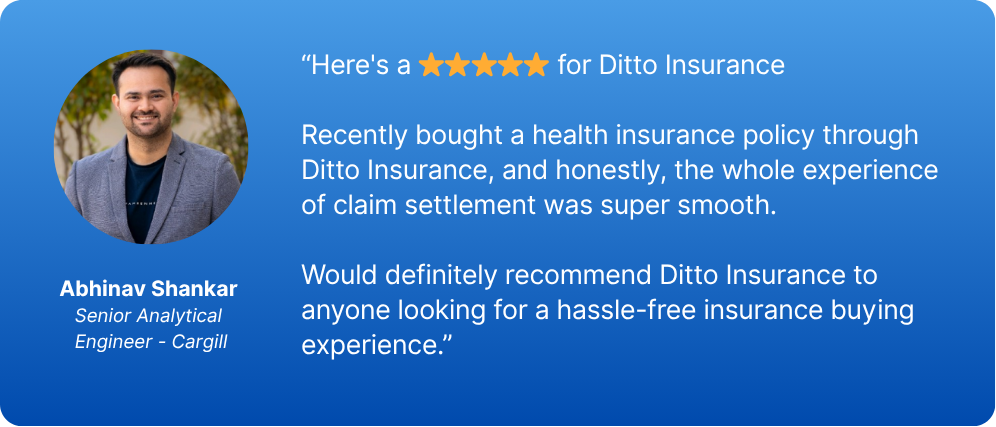Quick Overview
Wondering if Care Health Insurance is good or not? Given its wide hospital network and competitively priced, feature-heavy plans with comprehensive add-ons, this insurer is a good option. In this guide, we walk you through Care Health insurance, its key strengths and limitations, claim procedures, and whether it is a good fit for you.
Overview of Care Health Insurance
About Care Health
Care Health Insurance (formerly Religare) is a leading standalone health insurer in India, offering flexible, wellness-focused health plans for individuals, families, and senior citizens. In addition to health insurance, the insurer also offers travel and group insurance.
Market Presence and Years of Operation
Care Health has operated for over 13 years and has built a broad footprint across India. With over 260 branches, the insurer offers a strong cashless reach. Add-ons for unlimited cover and bonus, reducing PED waiting periods, GYM memberships, and consumables coverage, make it flexible for different health needs.
Types of Health Insurance Plans Offered
- Comprehensive Individual, family floater, plans like Care Supreme & Care Ultimate
- Maternity plans like Care Joy Today
- International coverage plans like Care Advantage
- Last resort option, like Care Freedom for people with severe PEDs
- Super Top-Up plans like Supreme Enhance Super-Top Up
How Good is Care Health Insurance: Key Performance Metrics
Insights:
- The CSR has steadily increased from 90.03% to 96.74%, showing better claims handling efficiency over time.
- The ICR has moved up each year, indicating higher claim payouts as business and utilization grow.
- Annual business volumes have increased significantly, reflecting strong customer acquisition and market expansion.
- Complaint levels are high, with a slight spike in FY 24–25, which indicates that the service quality can be improved as scale increases.
Care Health Insurance Reviews and Customer Feedback
Since Care is a partner insurer of Ditto’s, our experience with Care Health has been largely satisfactory. That said, the insurer does see relatively higher complaint volumes, which is something customers should keep in mind while evaluating their options.
Though the complaint volume is on the higher end, the process can be hassle-free if you go for a reliable insurance agent and talk to an experienced advisor before purchasing a health plan.
Real Claim Scenario
Takeaway: Care Health is usually receptive to escalations, reviews cases on their merits, and is willing to reverse a decision when the documentation clearly supports the customer.
Key Benefits of Care Health Insurance
Wide Network of Cashless Hospitals
Range of Health Insurance Plans
Senior Citizen (Focused Health Insurance Options)
Coverage for Pre-Existing Diseases (Conditions Apply)
Drawbacks of Care Health Insurance
1) Common Issues Reported by Policyholders
Some customers report claim rejections due to alleged non-disclosure of very old medical tests, even when these had no clear link to the claim. That said, many of these issues usually arise when you don’t have a reliable intermediary, such as a trusted agent or an efficient TPA, to guide you through the process.
2) Claim Delays and Rejection Concerns
Care Health has faced regulatory scrutiny for claim settlement practices. Issues highlighted include incomplete documentation, reductions in approved amounts without proper validation, and unclear communication around claim rejections.
3) Customer Service and Support Limitations
Policyholders often face unclear escalation paths and difficulty getting timely resolutions. In emergency cases, this can add financial and emotional strain, especially when claims are delayed or denied without clear explanations.
Care Health Insurance Claim Experience
1) Cashless Claim Process
To experience a smooth cashless claim, follow these simple steps:
- Pick a hospital from Care Health’s network. Locate the nearest one.
- Contact the hospital’s insurance help desk or billing counter. Carry the patient’s insurance card/policy copy, pre-authorization form, and a valid government ID for verification. Here’s what the form looks like.
- After you submit the pre-authorization form, the hospital sends this form to Care Health for approval.
- The insurer checks the request and sends a decision within one hour.
Alternatively, you can visit their self-help portal and initiate the claim procedure by entering your policy details via Claim Genie.
Note: For planned hospitalization, the insurer should be informed at least 48 to 72 hours before the scheduled procedure. In case of an emergency hospitalization, the insurer must be notified within 24 hours of admission to avail cashless claim benefits.
2) Reimbursement Claim Process
To experience an easy reimbursement claim, follow these simple steps:
- Inform your health insurer about the hospitalization, preferably before getting admitted or at the most within 24 hours of being hospitalized.
- Collect all the invoices generated by your hospital and pay the final bill from your own pocket.
- Post-discharge, file the claim settlement form and submit it to your insurer.
- Once the insurer reaches out to you, within 15 working days, submit the documents.
Here’s a snippet of the documents you will require for a reimbursement claim at Care:
Take Note: For both kinds of health claims, you can use the Care Health customer app for a quick and online experience.

3) Factors Affecting Claim Approval
Policy Terms and Conditions
Read and understand key clauses like sub-limits, waiting periods, co-payments, and exclusions. If anything feels unclear, speak to an advisor before you rely on the cover.
Insurer’s Approval
For planned hospitalisation, inform your insurer a few days in advance. Delayed intimation can complicate or weaken a claim, even if the treatment itself is covered.
Claim Documents
Missing papers can slow your claim approval. Always keep prescriptions, investigation reports, approval letters, original bills, and the discharge summary.
Types of Claims
Cashless claims reduce effort and errors since the insurer or TPA settles bills directly with the hospital. You only pay for non-covered items.
Honest Disclosures
Non-disclosure of medical history is one of the biggest reasons for claim rejection. Share accurate health details with your insurer. It is always safer to pay a fair premium than risk denial during a medical emergency.
4) Common Reasons for Claim Rejection
Claim rejections can be stressful, but happen due to avoidable reasons like missing information, incomplete documents, or small technical errors.
Read more about health claim rejections and how you can avoid them.
Things to Check Before Buying Care Health Insurance
- Network Hospital Availability in Your City: Ensure that Care Health Insurance has a good number of network hospitals like Apollo or Manipal in your city so you can easily avail of cashless treatment when needed.
- Waiting Periods and Co-Payment Clauses: Check the waiting period for PED and specific treatments. Also, see if the policy has any co-payment clause where you must share a part of the claim amount.
- Policy Wordings and Exclusions: Read the policy wording carefully to understand what is covered and what is not.
Here’s a health insurance checklist you would want to go through before purchasing a policy.
Who Should Go for Care Health Insurance?
- People with mild or manageable pre-existing conditions like controlled BP or early-stage diabetes
- Young professionals and families looking for affordable, comprehensive coverage
- First-time health insurance buyers and parents with generally good health histories
Why Choose Ditto for Your Health Insurance?
At Ditto, we’ve assisted over 8,00,000 customers with choosing the right insurance policy. Here’s why customers like Abhinav love us:

- No-Spam & No Salesmen
- Rated 4.9/5 on Google Reviews by 5,000+ happy customers
- Backed by Zerodha
- 100% Free Consultation
You can book a FREE consultation with us. Slots are filling up quickly, so be sure to book a call now or chat with us on WhatsApp!
Ditto’s Take on Care Health
Care Health offers comprehensive plans like Care Supreme and Care Ultimate. Their flexible plans and customizable waiting periods make them a trusted choice, despite a moderate complaint volume. The insurer offers add-ons like Reduction in PED waiting period and Claim Shield, which customise your health policy.
In case you bought a Care health policy through Ditto, you can contact us for a quick and smooth health claim experience.
Disclaimer: Care Health is our partner. If you’d like expert advice on whether their health plans fit your medical needs, book a call with us. You can also explore our comprehensive health insurance plans for 2026 to compare options and choose what suits you best. Learn more about how we evaluate health plans through Ditto’s Cut.
All information in this article is based on publicly available sources and our first-hand experience of working with the insurer over the past five years while assisting customers with health insurance decisions.
Frequently Asked Questions
Last updated on:










